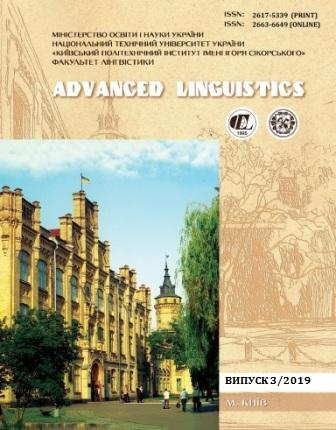CONTRIBUTION OF ENGLISH LINGUA FRANCA TO STABLE CROSS-CULTURAL COMMUNICATION
DOI:
https://doi.org/10.20535/2617-5339.2019.3.155213Ключові слова:
English lingua franca, linguistic situation, expanding circle, effective communicative event, deviation from norms, professional culture, communication instrument.Анотація
The article deals with the phenomenon of English lingua franca (ELF) and its rapid expansion on the territory of Europe. With globalization processes growing, cross-cultural awareness is bound to be enhancing the use of a common language for international interactions. The expanding circle of English incorporates its variety which is used for cross-cultural communication exclusively by non-native speakers. There is no one who speaks English lingua franca as a native language. Thus, the analysis of its functional value should be focused on the success of communication rather than on the number of deviations from the norms. The functional range of ELF allows its users to exploit it more liberally without being bound to any specific norms or regulations. The paper illustrates the influence of the linguistic situation in Europe on the formation of a new type of the language of intercultural communication (English lingua franca) with reference to the professional culture of seafarers. It has been taken into consideration that international seafarers use ELF for their communication, both oral and written, thus contributing to the process of de-standardization of the English language. The content analysis of certain texts (extracts from seafarers’ professional correspondence) shows some independence of communicative effect from correct / incorrect grammatical and structural form of the utterance based on the use of professional sublanguage and its implicit effect. English lingua franca is promptly becoming an effective communicative instrument of mighty force. It represents a certain cultural segment and enjoys sustainable development.
Key words: linguistic situation; expanding circle; effective communicative event; deviation from norms; professional culture; communication instrument.
Посилання
Brutt-Griffler, J. (2002). World English: a study of its development. Clevedon, UK: Multilingual Matters.
Jenkins, J. (2007). English as a Lingua Franca: Attitude and Identity. Oxford: Oxford University Press.
Kachru, B. (1989). Teaching World Englishes. Cross Currents, 16(1), 15–21.
Pennycook, A. (1994). The cultural politics of English as an international language. London: Longman.
Pennycook, A. (2002). English, Politics, Ideology. In T. Ricento (Ed.), Ideology, Politics and Language Policies (pp. 107–119). Philadelphia: John Benjamins.
Phillipson, R. (1992). Linguistic Imperialism. Oxford: Oxford University Press.
Phillipson, R. (2008). Lingua franca or lingua frankensteinia? English in European integration and globalization. World Englishes, 27(2), 250–267.
Seargeant, P. (2012).The politics and policies of global English. In A. Hewings & C. Tagg (Eds.), The politics of English: conflict, competition, coexistence (pp. 5–32). Abingdon: Routledge.
Wee, L. (2002). When English is not a mother tongue: Linguistic ownership and the Eurasian community in Singapore. Journal of Multilingual and Multicultural Development, 23(4), 282–295.
##submission.downloads##
Опубліковано
Номер
Розділ
Ліцензія
Наше видання використовує положення про авторські права CREATIVE COMMONS для журналів відкритого доступу.
Автори, які публікуються у цьому журналі, погоджуються з наступними умовами:
1. Автори залишають за собою право на авторство своєї роботи та передають журналу право першої публікації цієї роботи на умовах ліцензії Creative Commons Attribution License, котра дозволяє іншим особам вільно розповсюджувати опубліковану роботу з обов'язковим посиланням на авторів оригінальної роботи та першу публікацію роботи у цьому журналі.
2. Автори мають право укладати самостійні додаткові угоди щодо неексклюзивного розповсюдження роботи у тому вигляді, в якому вона була опублікована цим журналом (наприклад, розміщувати роботу в електронному сховищі установи або публікувати у складі монографії), за умови збереження посилання на першу публікацію роботи у цьому журналі.

